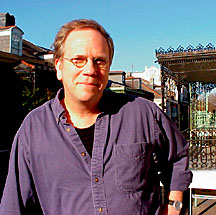|
Public radio's homesteaders on the
pop frontier Critique by Dave Bunker
American Routes is the other fiscally fortunate program on our list, its birth blessed and generously funded by CPB. When producer/host Nick Spitzer and executive producer Mary Beth Kirchner asked the corporation’s Radio Program Fund for $90,000 for research in 1997, the panel was so impressed with their proposal that it gave them $265,000 in start-up money instead. CPB funding peaked and is now in its final year of winding down. It has been replaced by the show’s current blend of grants from the NEH, the NEA and the Louisiana Endowment for the Humanities, and PRI affiliate revenue. The show recently parted ways with one underwriter, but the producers are confident about conversations with prospects, according to Spitzer. American Routes is an independent shop, with no home station. It has a full-time paid staff of five, plus Kirchner, who splits her time among this and other projects. This makes it a slightly smaller enterprise than World Cafe, and it matches that show in carriage, airing on 152 stations. American Routes’ website statement of eclecticism names "...blues and roots rock; ragtime and jazz; gospel and soul; zydeco and beyond," and the show’s playlists confirm regular coverage of all of this range except ragtime. In addition, the show can travel well beyond these bounds. On a recent program Spitzer introduced a produced piece about living in Point Hope, a tiny town in northern Alaska, with short samples of an avant garde vocal piece by Meredith Monk and Inuit throat singing. The show still has a definable sound though, based in both the musical cultures of New Orleans and in a historical period, for the music played is largely from the past rather than the present. Spitzer places the show’s central era roughly between the late ’40s and the early ’70s. Performers in the solid mainstream of American Routes’ sound include Ray Charles, Aretha Franklin, Bill Monroe, Leadbelly, Bob Dylan, Billie Holiday, the Staple Singers (a soul gospel group) and so on. Some contemporary performers, such as Lucinda Williams, appear occasionally when their music fits. Eclecticism is important to the show for two reasons. First, Spitzer regards explicating the influences of one kind of music on another as a major objective. "I feel like the progressive newness in our show is all these genres and the possibility of their connections," he says. "That’s where I think of my show as a contemporary artistic product, rather than just a ramble down memory lane." Second, since the producers have chosen to organize each week’s show around a specific theme, they benefit from having a large body of material from which to draw. In Spitzer’s view, the theme in turn keeps the program from becoming an exercise in self-indulgence: "Your eclecticism becomes a focused eclecticism, not just eclecticism for its own sake." Does the program also have a rock threshold? Yes, says Spitzer. They avoid "highly produced, high-energy rock." But they also avoid the latest AAA hits on the Gavin or Billboard charts. In general the songs selected have faster, funkier beats than those on World Cafe. American Routes is unashamed to boogie and refreshingly fun to listen to as a result. American Routes is the most highly produced of the shows under consideration here, featuring tightly scripted host breaks, NPR news-style produced segments, and highly edited interviews with artists that also have an NPR newsmagazine sound. The interviews generally feature a short segment of conversation making a point about a tune, followed by a snippet of that tune to illustrate. Then the tune stays in as a music bed under the next bit of talk, so that music remains a nearly constant presence. The producers are aware that this mix makes the program more than just a simple music show, and that suits them fine. The show addresses "American culture and life through music," says Spitzer, and he places it in a class with This American Life, Studio 360 and Fresh Air Weekend rather than World Cafe and Echoes. Some production elements seem excessive. One recent long segment intercut beat poet Jack Kerouac reading from his "History of Bop" with musical selections by Charlie Parker, Dizzie Gillespie and other performers he mentioned. It was cleverly produced to the point of showing off, and the relentless bop inflections of both the reading and playing made for strenuous listening. Spitzer can also overwrite, preparing scripts in a dense, florid style that looks great on paper, with its alliteration, sophisticated word choices and artfully balanced phrases, but which can outpace listeners’ ability to assimilate what he is saying. Add to this information-crammed prose a mannered and syncopated delivery—Spitzer plays his voice like a jazzy baritone sax—and it’s a potentially bewildering spectacle rather than a friendly get-together. Spitzer uses the first person, states opinions, and makes personal connections, but the slick showmanship of the production distances him from the listener, and for every moment of pleasure at the acrobatics there’s another moment which, while not excessive enough to make a person reach for the knob, does seem worthy of a roll of the eyes. Like World Cafe, American Routes has an expansionist spirit, though with a focus more on material covered in the show rather than station carriage. In the future, says Spitzer, the show will seek to refine and improve its features, engaging more independent producers to bring in more slices of life and regional accents from around the country.
|
Nick Spitzer, host of American Routes, in the program's hometown, New Orleans. (Photo: Kaori Maeyama.) |
|
 |
To Current's home page |
| Earlier news: American Routes moves toward premiere in 1998. | |
 |
Outside link: The program's website. |
Web page posted March 18,
2002
Current
The newspaper about public television and radio
in the United States
A service of Current Publishing Committee, Takoma Park, Md.
E-mail: web![]() current.org
current.org
301-270-7240
Copyright 2002

